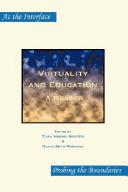| Listing 1 - 2 of 2 |
Sort by
|
Book
ISBN: 9813346817 9813346809 Year: 2021 Publisher: Gateway East, Singapore : Springer,
Abstract | Keywords | Export | Availability | Bookmark
 Loading...
Loading...Choose an application
- Reference Manager
- EndNote
- RefWorks (Direct export to RefWorks)
This book emphasizes that learning efficiency of the learners can be increased by providing personalized course materials and guiding them to attune with suitable learning paths based on their characteristics such as learning style, knowledge level, emotion, motivation, self-efficacy and many more learning ability factors in e-learning system. Learning is a continuous process since human evolution. In fact, it is related to life and innovations. The basic objective of learning to grow, aspire and develop ease of life remains the same despite changes in the learning methodologies. Introduction of computers empowered us to attain new zenith in knowledge domain, developed pragmatic approach to solve life’s problem and helped us to decipher different hidden patterns of data to get new ideas. Of late, computers are predominantly used in education. Its process has been changed from offline to online in view of enhancing the ease of learning. With the advent of information technology, e-learning has taken centre stage in educational domain. In e-learning context, developing adaptive e-learning system is buzzword among contemporary research scholars in the area of Educational Data Mining (EDM). Enabling personalized systems is meant for improvement in learning experience for learners as per their choices made or auto-detected needs. It helps in enhancing their performance in terms of knowledge, skills, aptitudes and preferences. It also enables speeding up the learning process qualitatively and quantitatively. These objectives are met only by the Personalized Adaptive E-learning Systems in this regard. Many noble frameworks were conceptualized, designed and developed to infer learning style preferences, and accordingly, learning materials were delivered adaptively to the learners. Designing frameworks help to measure learners’ preferences minutely and provide adaptive learning materials to them in a way most appropriately.
Education --- Computer uses in education --- Computers in education --- Educational computing --- Microcomputer uses in education --- Microcomputers in education --- Data processing. --- Data Mining --- Pädagogik --- E-Learning --- Learning on demand --- Telelearning --- Teleteaching --- Electronic Learning --- Virtuelles Lernen --- Computerunterstütztes Lernen --- Lernsoftware --- Selbstunterricht --- Selbststudium --- Integriertes Lernen --- Erziehungswissenschaft --- Pädagogischer Prozess --- Erziehungswissenschaften --- Bildungstheorie --- Erziehung --- Pädagoge --- Pädagogin --- Datamining --- Datenmustererkennung --- Data-Mining --- Suchverfahren --- Wissensextraktion --- Computerunterstütztes Lernen --- Digitales Lernen

ISBN: 9401203288 142946805X 9781429468053 9789401203289 9042020547 9789042020542 Year: 2006 Publisher: Amsterdam ; New York : Rodopi,
Abstract | Keywords | Export | Availability | Bookmark
 Loading...
Loading...Choose an application
- Reference Manager
- EndNote
- RefWorks (Direct export to RefWorks)
The main common themes of an earlier book in this series, Virtual Learning and Higher Education , were: the extent to which education should become 'virtual', the actual cost and value of such innovation and to what degree such education suits its stakeholders. In order to further engage with these important issues a conference was held in Mansfield College, Oxford in September 2003. An edited selection of the papers from that event along with relevant papers that developed as a result of the conference's subsequent correspondences are the contents of this book. The chapters cover a spectrum of practical issues from 'at the e-chalkface' experimentations with virtual technologies via those who consider the consequences of establishing such systems through to those interested in developing long-term strategy or policy in the area. This stimulating and important book is aimed at researchers of topics such as technology-driven education, philosophy, innovation and cultural studies. It is also meant to appeal to anyone with an interest in the 'virtual' world of education.
Distance education --- Education, Higher --- Educational technology --- Internet in higher education --- College students --- Higher education --- Postsecondary education --- Universities and colleges --- Effect of technological innovations on --- Education --- Distance education. --- Educational technology. --- E-Learning --- Hochschulbildung --- Internet in higher education. --- Effect of technological innovations on. --- Akademische Bildung --- Hochschulausbildung --- Postsekundäre Bildung --- Universitäre Bildung --- Bildung --- Studium --- Learning on demand --- Telelearning --- Teleteaching --- Electronic Learning --- Virtuelles Lernen --- Computerunterstütztes Lernen --- Lernsoftware --- Selbstunterricht --- Selbststudium --- Integriertes Lernen --- Instructional technology --- Technology in education --- Technology --- Educational innovations --- Instructional systems --- Teaching --- Technological innovations --- Distance learning --- Open learning --- Telecommunication in education --- Aids and devices --- Computerunterstütztes Lernen --- Postsekundäre Bildung --- Universitäre Bildung --- Digitales Lernen
| Listing 1 - 2 of 2 |
Sort by
|

 Search
Search Feedback
Feedback About UniCat
About UniCat  Help
Help News
News